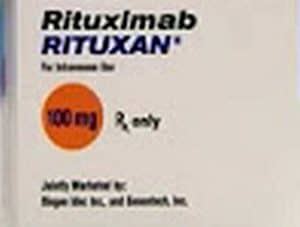
Rituxan May Cause Brain Disease. On December 19, 2006 Genentech issued a warning to healthcare providers for their oncology drug Rituxan, advising them that the drug has been linked to the deaths of two lupus patients from a rare brain disease, called Progressive multifocal leukoencephalopathy (PML). On November 10, 2006, Health Canada and the manufacturer […]

Rituxan May Cause Brain Disease. On December 19, 2006 Genentech issued a warning to healthcare providers for their oncology drug Rituxan, advising them that the drug has been linked to the deaths of two lupus patients from a rare brain disease, called Progressive multifocal leukoencephalopathy (PML). On November 10, 2006, Health Canada and the manufacturer of Rituxan (Generic: rituximab) issued a new safety warning for the drug. Reports of Bowel obstruction and gastrointestinal perforation lead to the new safety warning for Rituxan (Generic: rituximab). Rituxan is prescribed to treat B-cell non-Hodgkin’s Lymphoma (NHL) and Rheumatoid Arthritis (RA). Rituxan first gained FDA approval in 1997. ‘Rituxan’ is manufactured by Genentech, Inc.
Reports of abdominal pain, bowel obstruction, and perforation, in some cases leading to death, have been observed in patients receiving Rituxan. The bulk of reports, including all deaths, have occurred in patients receiving ‘Rituxan’ in combination with chemotherapy for the Non-Hodgkin’s Lymphoma (NHL) indication.
A causal relationship connecting Rituxan and these events has not been established. In post-marketing reports of patients with Non-Hodgkin’s Lymphoma (NHL), the mean time to onset of symptoms was 6 days from the start of therapy (range 1 day to 77 days) for documented gastrointestinal perforation. Complaints of abdominal pain, particularly early in the course of treatment, should prompt a thorough diagnostic assessment and appropriate treatment.
Discoverings from the pharmacovigilance database for Rituxan point outs that 47 cases of bowel obstruction (9 deaths), and 37 cases of gastrointestinal perforation (4 deaths), have been reported in ‘Rituxan’ patients, based on an approximately 730,000 cumulative patient exposure. The reports originate from both spontaneous sources and clinical studies and the majority of these cases were reported for the Non-Hodgkin’s Lymphoma (NHL) indication. Analysis of the data from the majority of the 47 cases of bowel obstruction was difficult due to multiple risk factors, including gastrointestinal lymphoma, various other gastrointestinal disorders, and concomitant treatments, such as chemotherapy, steroids, and radiation therapy.
The location of gastrointestinal perforation in the cases of Non-Hodgkin’s Lymphoma (NHL) included both the upper and lower gastrointestinal tract. Regular risk factors in these reports included a history of gastrointestinal lymphoma at the time of the event and documented concomitant medications, including chemotherapy and prednisolone. Despite these confounding factors, a contributory role of ‘Rituxan’ in causing gastrointestinal perforation in patients diagnosed with Non-Hodgkin’s Lymphoma (NHL) has not been excluded. In addition, a pooled analysis of clinical trials in patients with Non-Hodgkin’s Lymphoma (NHL) has indicated a higher incidence of gastrointestinal perforation in the arms treated with Rituxan/chemotherapy compared to the arms treated with chemotherapy alone (0.38% vs 0.15%). There have been 2 reports of bowel obstruction (1 death) and 2 reports of gastrointestinal perforation originating from Canada.
The personal injury attorneys at Parker Waichman LLP offer free, no-obligation case evaluations. For more information, fill out our online contact form or call 1-800-YOURLAWYER (1-800-968-7529).


